This article contains SPOILERS of The Bear Season 3.
– “You don’t have kids. Dude, you have a 15-year-old.”- Computer
– “I’m not talking about that one.”- Uncle Jimmy
The Bear season 3 was recently released and it is already creating a lot of commentary on Carmy’s emotions, family drama, and PTSD from abuse in the kitchen. This series has always been controversial as it has been categorized as a comedy TV show. Audiences seem to disagree with it and have even said it doesn’t have any jokes and that it is only drama. However, when I first read people’s comments on social media saying it’s not comedy, I realized I had put much thought into it. Without denying its dramatic nature, I always thought it was funny. Watching the first two seasons, I couldn’t stop laughing at Beef’s dynamic with its workers and the jokes between Richie, Neil, and Theo.
This last season, I couldn’t stop thinking about opinions judging the lack of humor. I thought this season was still funny, but it delved a bit more into Carmy’s demons as everyone else progressed with their lives. In the past two seasons, we got to see how Carmy grew up and went from being a young man to an accomplished chef with a complicated family background. However, this season we got to see how each character has faced their biggest challenges and how they overcame them. For example, episode six, Napkins, was the highest rated of this season with a 9.3 on IMDB because it explored a very common struggle in society, that the media rarely touches. The theme of the episode showed us what it’s like to navigate unemployment as a middle-aged Hispanic woman with no degree. This episode was very emotional because it showed us Tina’s vulnerable and intimate side, which we rarely see as she presents herself as a strong woman with no weaknesses. It also showed us how even as adults, people feel lost and need help. More importantly, it touches on how nothing is for sure, including jobs. Things might change unexpectedly and all we have left is to find ways of adapting. This episode is one of this season’s greatest accomplishments, not only due to the themes it expresses and how they unravel, but because it was Ayo Edebiri’s (Sydney) directorial debut.
We also watched very emotional scenes like Nat’s in episode 8, Ice Chips, when she goes into labor and the only person who answers the phone is her mom, Dee Dee. In this episode, Nat and Dee Dee mend fences by opening up. Dee Dee apologizes for the mistakes she made whilst being drunk and she also tells Nat that she has an idea of why she didn’t tell her she was pregnant but doesn’t fully understand. To that, Natalie responded she had scared all the family with her behavior. This mother-daughter scene is very emotional because not everyone has grown up with an alcoholic parent, yet almost everyone has struggled when it comes to family and accepting their loved ones entirely.
«Growing old and forgiving your parents means understanding their mistakes came from an unstable place instead of an authentic one.»
I kept crying in this scene because I couldn’t stop thinking about my mom. My mom has never been dependent on any substance, but she has been very judgmental towards my way of being. Just like Nat, there were a couple of years when I didn’t speak to my mom and reconnecting after years made me realize that loving and accepting a parent or a child is not always something one can do to the fullest. There will always be some things that one will disagree with, and some people can’t cope with it, especially people dealing with mental illness. Growing old and forgiving your parents means understanding their mistakes came from an unstable place instead of an authentic one. Perhaps, all those judgments weren’t as true, but rather a projection of what our parents think of themselves instead of us. I think that is what The Bear portrays, the cycle of acceptance and forgiveness within dysfunctional families and ourselves.
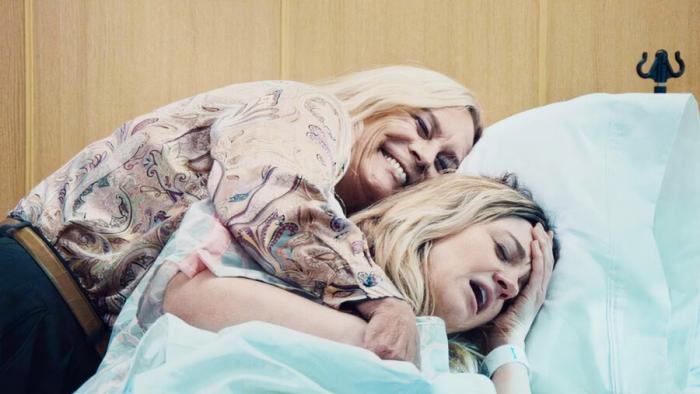
The thing The Bear nails is its comedic timing. In that same episode after making audiences cry and think about their own experiences, the tension is broken when DeeDee hugs Nat and as she tries to massage her and alleviate the pain, she bursts out laughing saying Nat’s ass feels just like her father’s. The most hilarious part of that scene is Nat’s reaction yelling an unexpected – “What the fuck!”-. This kind of humor proves The Bear’s position as a comedic show. Isn’t that the true nature of humor? Saying something so out of touch, irreverent, and irrelevant at the perfect moment. The funniest things are the ones you expect the least, the funniest jokes are the ones that make you think of their depth portraying circumstances in a completely different light. Making unpredictable and ingenious jokes the most enjoyable ones.
People who say The Bear is not funny are probably expecting goofy foolery and impulsive actions, but this isn’t the Grown Ups franchise. If we wanted jokes about men dressed as women, we wouldn’t be watching The Bear in the first place. The Bear offers complex humor with occasional banter like Neil and Theo’s childish behavior, for example when they visit Claire at the hospital and mention Carmy being in love with her and then she asks Theo if he accidentally got in an Operating Room and him confirming it. Yet if we had Neil and Theo’s dynamic constantly as the only source of comedy, we’d get tired of it.
The Bear masters comedic subtlety, for example, when Carmy tells Neil to serve the soup to the dinner guests and he only pours the water in front of them and then takes it back to the kitchen. This is humor at its best because it is irreverent. Overall, The Bear’s humor is always relating to complicated feelings just as the best jokes of contemporary comedy are. Although they are getting very repetitive and mechanical, nowadays jokes about colonialism are greatly appreciated by audiences because they are linked to a bigger problem. To be honest, people who continue to expect foolish humor instead of well-thought jokes are missing out on the wits of analyzing problems on a deeper level. Sometimes problems become too difficult to comprehend and humor performs a life-saving approach as it increases the possibility of understanding the issue and overcoming it. For example, Theo and Neil’s discussion before seeing Claire at the hospital:
– “Theo: Are we going to heaven?”
– “Neil: What religion are we?”
This joke reflects on how humans worry about good and bad making it a matter that revolves around them and if it will retribute them in the future. We rarely stop and think about how our actions affect other people’s lives. It also plays a commentary on religion and how we are expected to be good and moral to be accepted in heaven, as long as we follow the entitled wishes placed by that same religion.
Reading Philosophy of Humor by John Morreall, I understood that compared to all the documented philosophies and ideas in human history, comedy is the genre that has been studied the least. And the study of laughter and humor only began in the 20th century. Morreall even goes in detail by saying –“Martian anthropologists comparing the amount of philosophical writing on humor with what has been written on, say, justice, or even on Rawls’ Veil of Ignorance, might well conclude that humor could be left out of human life without much loss“- (Morreall, 2016). That doesn’t mean losing any record of what humor means for humanity wouldn’t be important, it means the quantity of studies about humor is minimal compared to any other literature.
If we were to analyze how humor has changed in the past twenty years, we’d see it has leaped in a different direction, especially in mainstream media. Think about what comedy meant for film and TV in the early 2000s. Jim Carrey was everywhere with his hilarious, silly, and out-of-the-ordinary facial expressions, Pheobe Buffay was yelling after she realized her best friends were sleeping with each other or singing about a smelly cat. Nowadays we have a world of mediatic overconsumption. People scroll through TikTok for hours consequent to the rise of Vine with irreverent 6-second videos being the epitome of humor.
«Audiences want something authentic, most importantly, intellectual. Viewers are craving jokes that make them think beyond the Status Quo.»
In 2024, the most consumed type of humor seems to be comedy stand-up and how “woke” jokes and racial/class awareness comedians bring to the table. Now people argue a lot about “woke culture” being the end of comedy. We have celebrity comedians fighting against it and also establishments demanding it. However, in the film industry, which differs from monologues on stage, it appears that audiences want something relatable, they don’t want any more celebrities joking about how rich they are. Audiences want something authentic, but most importantly, intellectual. Viewers are craving jokes that make them think beyond the Status Quo. Is this phenomenon present in screenplays due to viewership demand but also by the writer’s intentions? I think humor is changing because society, with the help of social media and globalization, wants to express its feelings rather than cover them up. It is as if humor is now being used as a tool to cope with trauma instead of a weapon to repress it. That is what The Bear does with humor, it proves this new facet of what it means to be amusing or, even, hysterical.


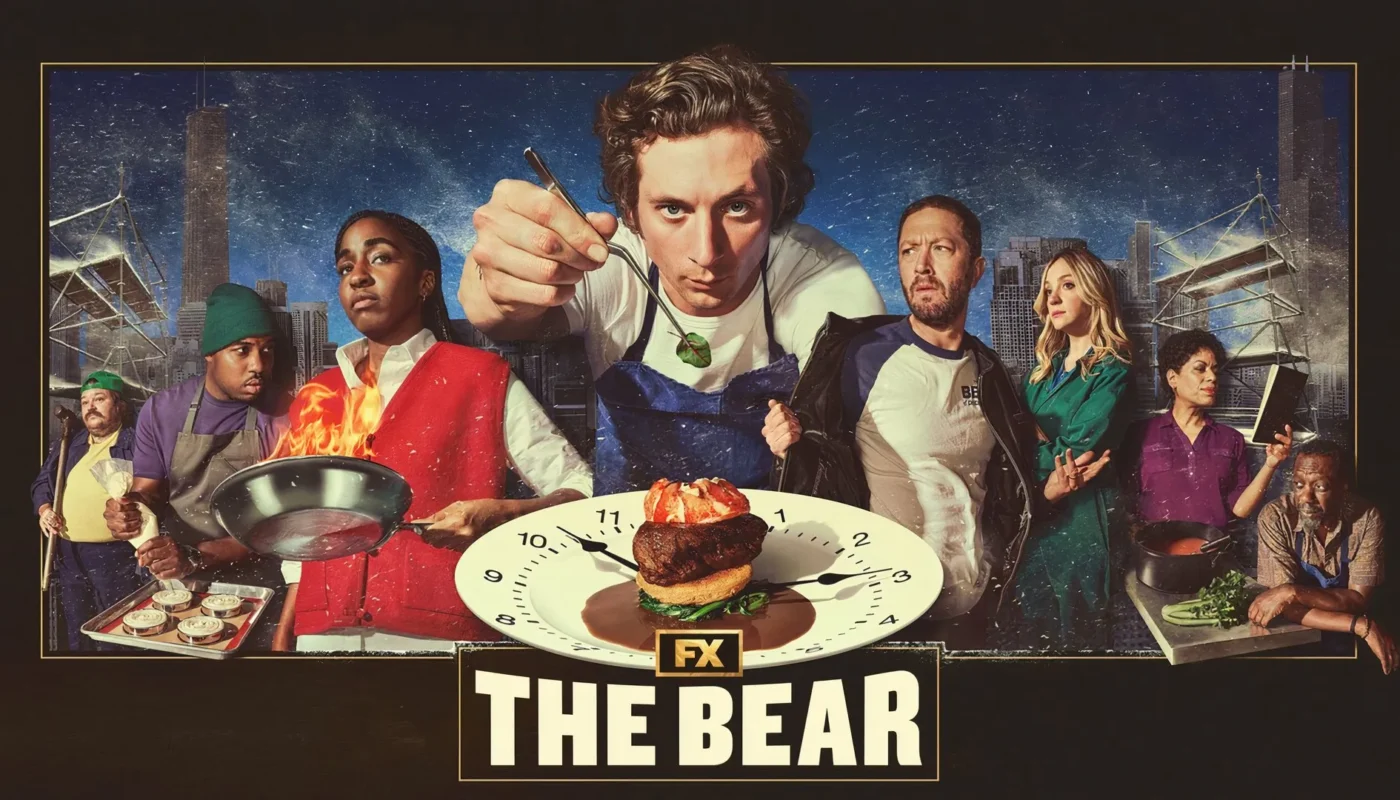
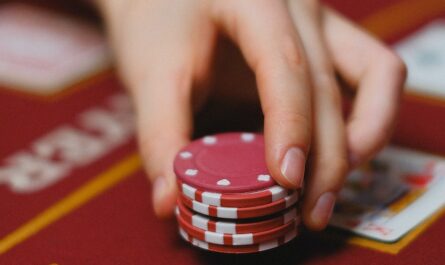
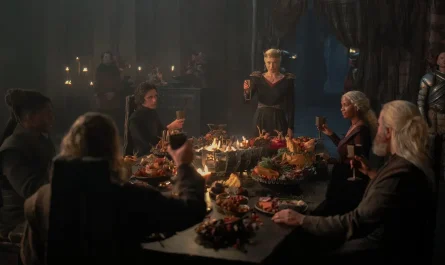
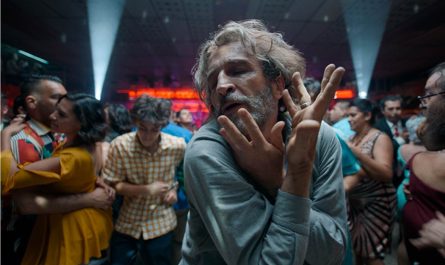
Посетите наш Интернет магазин 3D принтеров, чтобы найти идеальное оборудование для ваших творческих проектов!
важный этап – ключевой шаг
Найдите идеальный вариант для своего бизнеса и slm 3d принтер купить|3д принтер slm купить|slm принтер по металлу купить|slm принтер купить уже сегодня!
Многие производители предлагают разные комплектации.
Современные решения в сфере программа для управления логистикой помогают значительно повысить эффективность и сократить затраты на перевозку и хранение товаров.
Готовность к изменениям и адаптация процессов — ключ к успеху.
Внедрение wms системы на складе позволяет значительно оптимизировать процессы учета и управления товарными запасами.
Реализация WMS позволяет значительно улучшить процессы управления складом . Системы управления складом (WMS) помогают автоматизировать множество процессов .
Начать с внедрения WMS необходимо с оценки существующих логистических операций . Важно выявить узкие места и определить области, требующие улучшения .
Следующий этап — выбор программного обеспечения, соответствующего вашим требованиям . Следует учесть все аспекты работы вашего склада при выборе системы .
Процесс внедрения требует как технической, так и организационной подготовки. Должны быть задействованы все сотрудники, чтобы обеспечить плавный переход на новую систему .
3d принтер по металлу купить обеспечивает высокую точность и качество изделий, что делает его идеальным выбором для промышленных потребностей.
3D принтер по металлу — это удивительное устройство, способное revolutionize производство. Каждый год развивается множество инноваций, которые поддерживают процесс печати. Технологии 3D печати по металлу все чаще используются в различных отраслях.
Применение 3D печати по металлу открывает новые возможности для предпринимателей. Используя эту технологию, можно создавать сложные детали с высокой точностью. Кроме того, процессы стали более эффективными и экономичными. В результате, это дает возможность сократить время на производство и снизить затраты.
Технология 3D печати металла основаны на слойном подходе, где каждый слой добавляется последовательно. Данная технология предоставляет шанс создавать объекты, которые невозможно изготовить другими способами. Ключевым моментом становится контроль качества на каждом этапе производства детали.
Перспективы технологии 3D печати выглядит очень многообещающим. По мере развития технологии совершенствуются, и появляются новые решения. открывает возможности для новых проектов и улучшает существующие. Скоро мы можем ожидать массового внедрения 3D принтеров по металлу на рынке.
Внедрение WMS системы значительно улучшает эффективность управления складскими процессами.
Обучение сотрудников – ключевой элемент успешного внедрения WMS.
Промышленный 3D принтер открывает новые горизонты для производств, позволяя создавать сложные детали с высокой точностью и эффективностью.
При их помощи можно создавать детали и изделия сложной формы. Многочисленные компании
3д сканер профессиональный цена предоставляют высококачественное 3D моделирование, обеспечивая точность и детализацию для различных профессиональных сфер.
Эти устройства широко используются в архитектуре, дизайне и даже медицине.
3д сканер купить
Эти устройства позволяют восстанавливать объекты с высокой точностью в цифровом формате.
3d сканер промышленный купить становятся всё более востребованными в производственной сфере благодаря своей точности и эффективности.
От автомобилестроения до аэрокосмической отрасли, эти сканеры играют ключевую роль.
Современные решения в сфере автоматизация управления логистикой помогают значительно повысить эффективность и сократить затраты на перевозку и хранение товаров.
Необходимо провести анализ текущих процессов, чтобы определить, какие из них требуют автоматизации.
online betting with paypal winnersbet
References:
https://friends4ed.co.zw/read-blog/6117_15-best-live-casinos-australia-play-against-live-dealers-online.html
Bạn sẽ có cảm giác như đang trở lại tuổi thơ khi điều khiển những chiếc súng bắn cá, xn88 slot săn lùng các loài cá quý hiếm để ghi điểm. Đây là trò chơi không chỉ giúp bạn giải trí mà còn rèn luyện sự khéo léo và nhanh nhạy. TONY12-26
Your point of view caught my eye and was very interesting. Thanks. I have a question for you.
I don’t think the title of your article matches the content lol. Just kidding, mainly because I had some doubts after reading the article. https://accounts.binance.com/register-person?ref=IHJUI7TF
Thanks for sharing. I read many of your blog posts, cool, your blog is very good. https://accounts.binance.com/uk-UA/register-person?ref=XZNNWTW7
Can you be more specific about the content of your article? After reading it, I still have some doubts. Hope you can help me. https://www.binance.info/ro/register?ref=HX1JLA6Z
Thanks for sharing. I read many of your blog posts, cool, your blog is very good.
Your point of view caught my eye and was very interesting. Thanks. I have a question for you. https://accounts.binance.com/ar-BH/register?ref=S5H7X3LP
Your article helped me a lot, is there any more related content? Thanks!